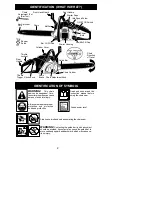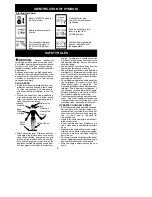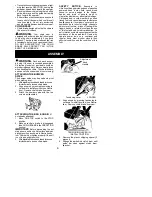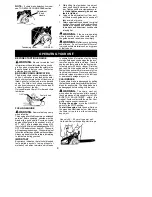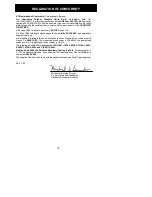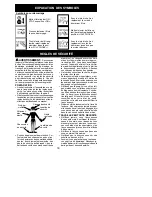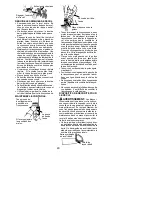
5
lar intervals with the engine stopped, never
with the engine running. Make sure the bar
clamp nuts are securely tightened after ten-
sioning the chain.
S
Begin and continue cutting at full speed. If
the chain is moving at a slower speed, there
is greater chance of kickback occurring.
S
Cut one log at a time.
S
Use extreme caution when re-entering a
previous cut.
S
Do not attempt cuts starting with the tip of
the bar (plunge cuts).
S
Watch for shifting logs or other forces that
could close a cut and pinch or fall into chain.
S
Use the Reduced--Kickback Guide Bar
and Low--Kickback Chain specified for
your saw.
MAINTAIN CONTROL
Never reverse
hand positions
Stand to the left of
the saw
Thumb on underside of
handlebar
Elbow locked
S
Keep a good, firm grip on the saw with both
hands when the engine is running and
don’t let go. A firm grip will help you reduce
kickback and maintain control of the saw.
Keep the fingers of your left hand encir-
cling and your left thumb under the front
handlebar. Keep your right hand complete-
ly around the rear handle whether your are
right handed or left handed. Keep your left
arm straight with the elbow locked.
S
Position your left hand on the front handle-
bar so it is in a straight line with your right
hand on the rear handle when making
bucking cuts. Never reverse right and left
hand positions for any type of cutting.
S
Stand with your weight evenly balanced on
both feet.
S
Stand slightly to the left side of the saw to
keep your body from being in a direct line
with the cutting chain.
S
Do not overreach. You could be drawn or
thrown off balance and lose control of the
saw.
S
Do not cut above shoulder height. It is diffi-
cult to maintain control of saw above
shoulder height.
KICKBACK SAFETY FEATURES
WARNING
:
The following features are
included on your saw to help reduce the hazard
of kickback; however, such features will not to-
tally eliminate this dangerous reaction. As a
chain saw user, do not rely only on safety de-
vices. You must follow all safety precautions,
instructions, and maintenance in this manual to
help avoid kickback and other forces which
can result in serious injury.
S
Reduced--Kickback Guide Bar, designed
with a small radius tip which reduces the
size of the kickback danger zone on the
bar tip. A Reduced--Kickback Guide Bar has
been demonstrated to significantly reduce
the number and seriousness of kickbacks.
Small Radius Tip
Reduced Kickback Symmetrical Guide Bar
Symmetrical Guide Bar
Large Radius Tip
S
Low--Kickback Chain, designed with a
contoured depth gauge and guard link
which deflect kickback force and allow
wood to gradually ride into the cutter.
Low-Kickback Chain
Contoured Depth Gauge
Elongated Guard Link
Deflects Kickback
Force And Allows
Wood To Gradually
Ride Into Cutter
S
Handguard, designed to reduce the
chance of your left hand contacting the
chain if your hand slips off the front handle-
bar.
S
Position of front and rear handlebars, de-
signed with distance between handles and
“in-line” with each other. The spread and
“in-line” position of the hands provided by
this design work together to give balance
and resistance in controlling the pivot of
the saw back toward the operator if kick-
back occurs.
WARNING
:
DO NOT RELY UPON
ANY OF THE DEVICES BUILT INTO YOUR
SAW.
YOU SHOULD USE THE SAW
PROPERLY AND CAREFULLY TO AVOID
KICKBACK. Reduced--kickback guide bars
and low--kickback saw chains reduce the
chance and magnitude of kickback and are
recommended. Your saw has a low kick-
back chain and bar as original equipment.
Repairs on a chain brake should be made by
an authorized servicing dealer. Take your
unit to the place of purchase if purchased
from a servicing dealer, or to the nearest au-
thorized master service dealer.


